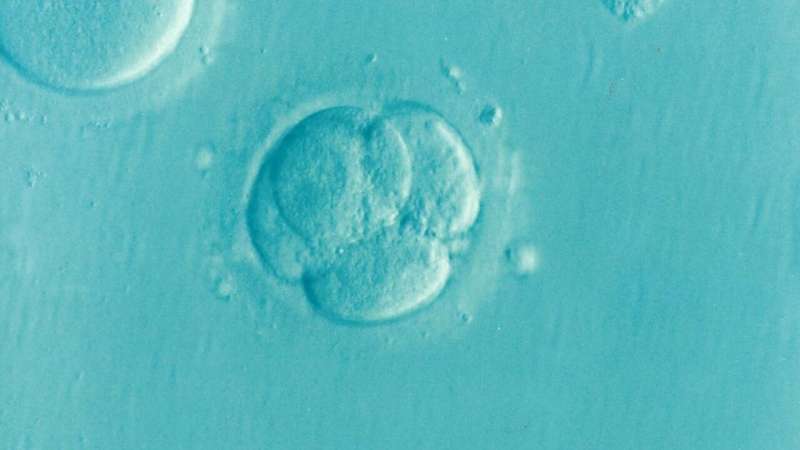This article has been reviewed according to Science X's editorial process and policies. Editors have highlighted the following attributes while ensuring the content's credibility:
fact-checked
trusted source
proofread
Breast cancer patients may use fertility preservation or assisted reproductive technologies

Using fertility preservation and/or assisted reproductive technologies (ART) did not adversely impact three-year cancer recurrence rates among patients with hormone receptor (HR)-positive breast cancer who paused endocrine therapy to become pregnant, according to results from the POSITIVE trial presented at the San Antonio Breast Cancer Symposium, held December 5–9, 2023.
"With the increasing age of childbearing, it is becoming more likely that women will be diagnosed with breast cancer before starting or completing their families," said Hatem A. Azim Jr., MD, Ph.D., an adjunct professor at the School of Medicine and Breast Cancer Center at the Tecnológico de Monterrey in Mexico.
"Many breast cancer patients may opt for fertility preservation prior to starting cancer treatment and/or may use ART to increase their chances of pregnancy," he added.
Fertility preservation refers to methods intended to maintain the reproductive potential of the patient. Such methods include ovarian stimulation (which entails using hormones to facilitate the retrieval of oocytes) for subsequent cryopreservation (freezing) of oocytes or embryos; cryopreservation of ovarian tissue; and the use of gonadotropin-releasing hormone analogs during chemotherapy to reduce the risk of premature ovarian failure.
ART includes various techniques to help the patient become pregnant, such as the transfer of cryopreserved embryos into a patient's uterus, ovarian stimulation for in vitro fertilization, intrauterine insemination, embryo or egg donation, ovarian tissue transplantation, and clomiphene use.
Results from the POSITIVE clinical trial presented at last year's San Antonio Breast Cancer Symposium suggested that patients with HR-positive breast cancer could safely pause endocrine therapy for up to two years to become pregnant without increasing their risk of breast cancer recurrence. However, the safety of conceiving after fertility preservation and/or ART for these patients remains unclear.
"There is a concern within the medical community that the use of fertility preservation or ART methods, particularly those that entail the use of hormones, could have detrimental effects on patients with HR-positive breast cancers," Azim noted.
To understand the impact of fertility preservation and ART, Azim and colleagues conducted a secondary analysis of outcomes from the POSITIVE trial. Among the 497 evaluable participants who paused endocrine therapy to attempt pregnancy, 368 (74%) became pregnant.
Among the patients who underwent some form of fertility preservation, 179 used embryo or oocyte cryopreservation prior to enrollment in the POSITIVE trial, while 215 used some form of ART to attempt pregnancy. The most commonly used ART was ovarian stimulation for in vitro fertilization and cryopreserved embryo transfer.
The study found that younger age and cryopreserved embryo transfer were the factors most associated with higher chances of pregnancy, with 82.4% of patients who underwent cryopreserved embryo transfer becoming pregnant.
Ovarian stimulation for cryopreservation, which precedes cryopreserved embryo transfer, was not associated with worse disease outcomes: 9.7% of patients who underwent this procedure experienced a breast cancer recurrence within three years compared with 8.7% of those who did not undergo the procedure.
"Participants who underwent cryopreserved embryo transfer during the study had higher pregnancy rates with no apparent short-term detrimental impact on breast cancer outcome," said Azim.
Additional analyses found that menstrual cycles returned within six months of pausing endocrine therapy in most patients who had amenorrhea at trial entry, and the type of adjuvant endocrine therapy the patient had received had no impact on the time to pregnancy.
Furthermore, the researchers found that younger patients became pregnant in a shorter time. "We found that at two years after enrollment, 80% of women younger than 35 years had a pregnancy compared to 50% of those who were older than 40," Azim said.
"Our data demonstrate the efficacy and short-term safety of different fertility preservation and ART options, building on the primary results of the POSITIVE trial and providing vital information for fertility counseling of young breast cancer patients," he noted.
A limitation of the study is the short follow-up time.



















